Overview
The article titled "7 AI Software Testing Assistants to Boost Your Efficiency" explores the coding challenges developers encounter and how various AI tools can enhance both efficiency and quality in software testing. It highlights seven different AI software testing assistants, including Kodezi, LambdaTest, and Rainforest QA. These tools automate processes, reduce manual errors, and significantly improve overall productivity in software development by addressing common challenges faced by developers.
Have you ever faced difficulties in managing software testing? Kodezi effectively addresses these challenges by offering specific features that streamline the testing process. For instance, it automates repetitive tasks, allowing developers to focus on more critical aspects of their projects.
The benefits of using Kodezi are substantial. By improving productivity and code quality, developers can deliver better software in less time. Imagine the efficiency gains when your testing processes are automated!
In addition to Kodezi, the article discusses other AI tools available on the platform that can transform your software testing experience. Explore these tools and discover how they can elevate your development process.
Introduction
In the ever-evolving landscape of software development, coding complexities present significant challenges for teams. As these challenges intensify, the integration of artificial intelligence is becoming a game-changer, reshaping testing and quality assurance practices. This article explores seven innovative AI software testing assistants that not only promise to enhance productivity but also streamline workflows, ultimately transforming the development environment.
With numerous options available, which tools truly stand out in meeting the unique challenges developers encounter today?
Kodezi | Professional OpenAPI Specification Generator - AI Dev-Tool: Automate Debugging and Test Maintenance
In the ever-evolving landscape of software development, coding challenges are a common hurdle that developers face. Kodezi OS emerges as a professional OpenAPI specification generator, designed to automate debugging and test maintenance. By continuously monitoring codebases, it detects issues and autonomously resolves them, ensuring that tests remain functional and up-to-date. This seamless integration with existing development workflows makes Kodezi an essential asset for B2B engineering teams striving to maintain high-quality code without the burden of manual intervention.
Furthermore, Kodezi CLI enhances code changes from developers by automatically fixing performance bottlenecks, identifying security issues, and ensuring compliance with the latest coding standards. Imagine a tool that not only streamlines your workflow but also actively improves your code quality—this is the power of Kodezi. Additionally, Kodezi OS automatically generates OpenAPI specifications, significantly streamlining API documentation and testing processes. This highlights the essential role of automation in enhancing application quality.
Moreover, with 39% of groups reporting efficiency gains from AI-driven test automation, Kodezi OS establishes itself as a strategic ally in the ongoing pursuit of software quality enhancement, acting as an AI software testing assistant. Are you ready to elevate your coding practices? Explore the tools available on the Kodezi platform and experience the transformation in your development workflow.
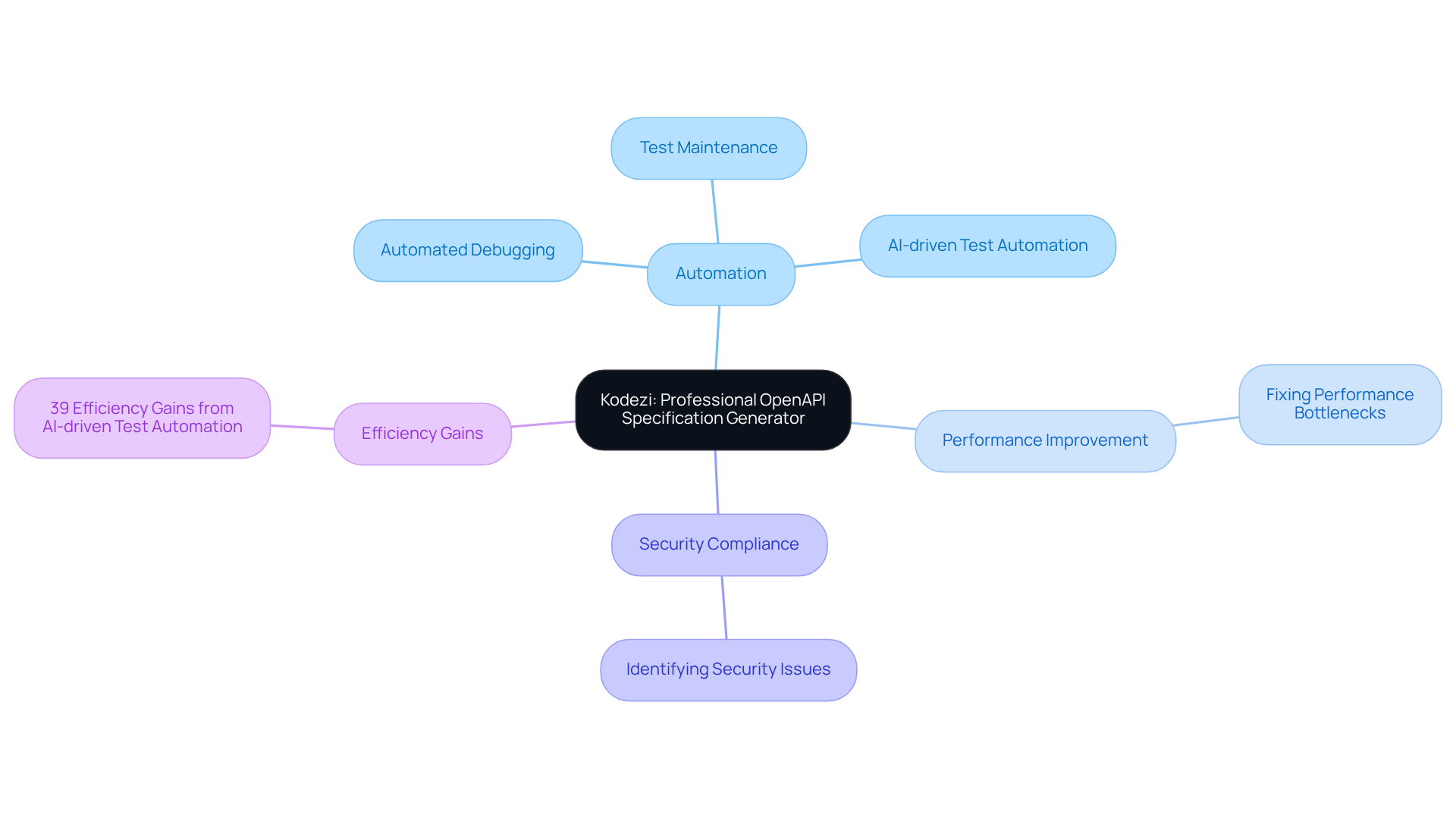
LambdaTest: Accelerate Testing with AI-Driven Automation
Developers often encounter significant challenges in assessing code quality and ensuring compatibility across various platforms. LambdaTest addresses these issues with its AI software testing assistant, which significantly improves efficiency in assessment. Its real-time browser examination feature allows teams to quickly pinpoint and resolve issues across a diverse range of browsers and devices, ensuring thorough test coverage. Furthermore, automated screenshot generation simplifies the workflow, enabling quicker feedback loops and faster resolutions.
Organizations utilizing LambdaTest have noted substantial time reductions, with the AI software testing assistant speeding up evaluation processes by as much as 80%. This capability not only enhances productivity but also elevates the overall quality of applications, making LambdaTest an indispensable resource for modern engineering teams. In addition, Kodezi's automated code debugging empowers developers to instantly identify and rectify codebase issues, ensuring compliance with the latest security best practices and coding standards.
As application evaluation experts emphasize, utilizing an AI software testing assistant is essential for accelerating assessment cycles and enhancing precision. This reinforces the platform's significance in the future of quality assurance. Are you ready to explore the tools available on LambdaTest and Kodezi? Discover how these solutions can transform your coding practices and elevate your projects.
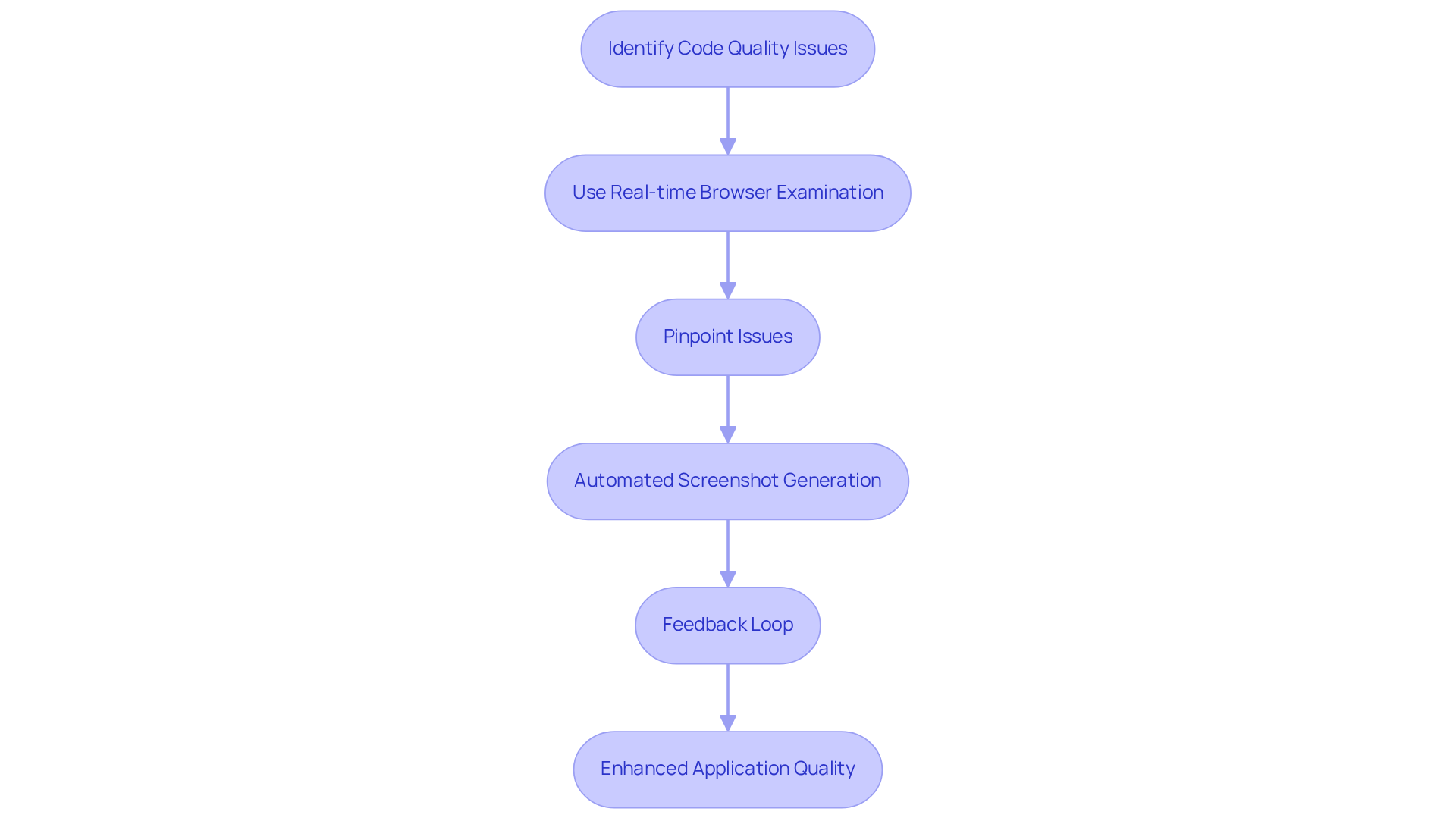
Rainforest QA: Simplify Test Creation and Maintenance with AI
Developers often face significant challenges when it comes to coding and testing. How can they streamline their processes while ensuring high-quality outcomes? Rainforest QA emerges as a solution, utilizing an AI software testing assistant to improve both test creation and maintenance. Its no-code platform empowers users to articulate tests in plain English, which are seamlessly transformed into automated tests.
Furthermore, this innovative approach accelerates the evaluation process and alleviates the workload on developers. With less time spent on assessment tasks, developers can focus more on coding. This simplification not only boosts productivity but also fosters a more efficient workflow. Ultimately, the result is a higher quality of outcomes in software development.
In addition, teams using Rainforest QA have noted significant improvements in their overall efficiency. By utilizing an AI software testing assistant to reduce the complexities associated with traditional testing methods, developers are better equipped to deliver exceptional products. Are you ready to explore how Rainforest QA can transform your testing processes and elevate your coding practices?
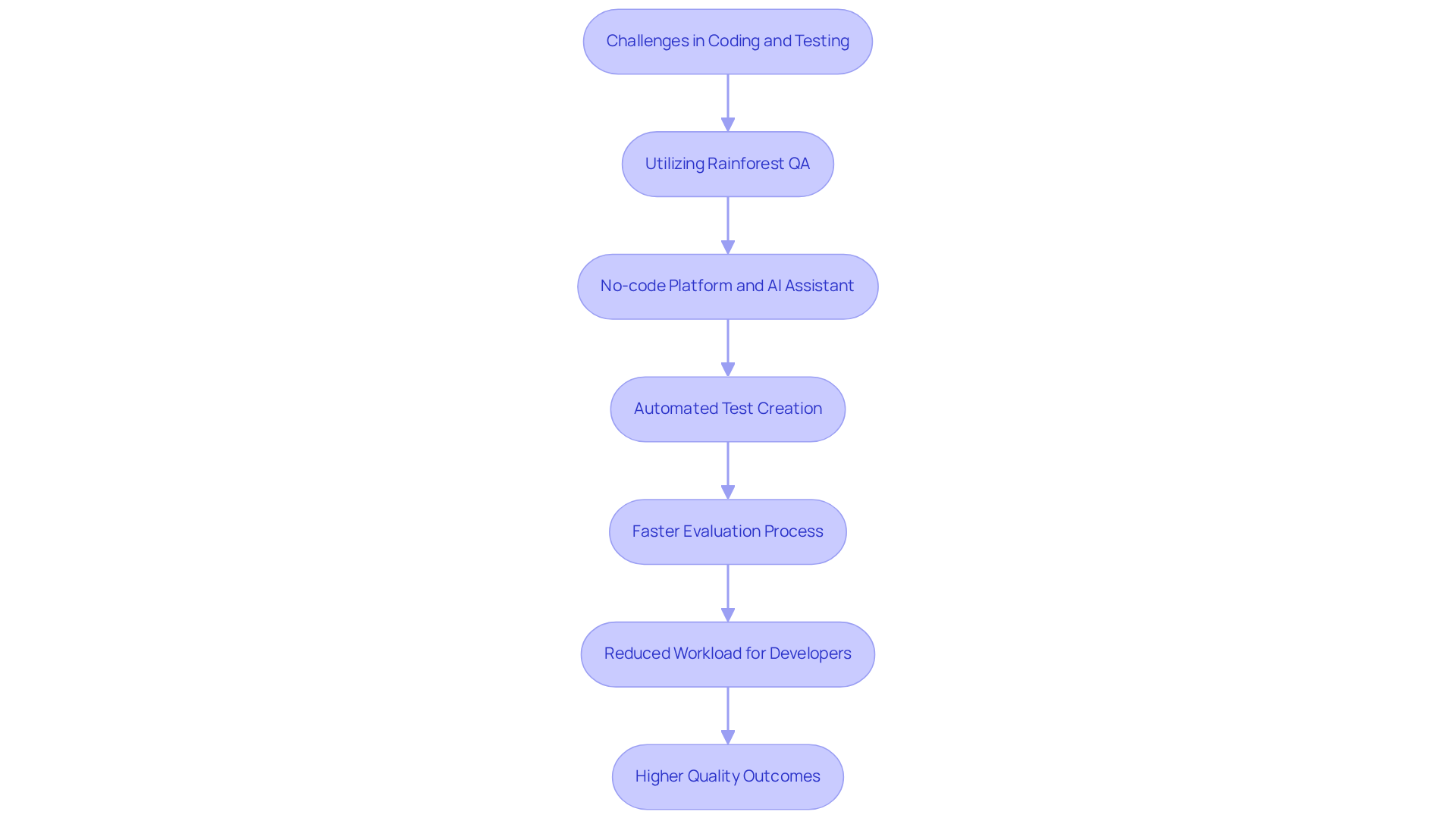
testRigor: Intelligent Test Case Generation and Autonomous Testing
In today's fast-paced development environment, coding challenges can significantly hinder progress. Kodezi CLI effectively addresses these challenges by providing a robust framework that serves as an AI software testing assistant for intelligent test case creation and autonomous evaluations. The AI software testing assistant enhances code quality by not only proactively identifying and rectifying issues before the code is pushed but also ensuring that tests are comprehensive and aligned with user requirements.
Furthermore, Kodezi CLI's auto-healing feature empowers teams to swiftly resolve code issues, thereby increasing programming productivity. This integration not only accelerates the evaluation process but also upholds security best practices and coding standards. As a versatile resource, Kodezi CLI is an excellent AI software testing assistant for teams looking to enhance their software development lifecycle.
Are you ready to maximize your team's efficiency? Consider integrating Kodezi CLI into your workflow and experience the benefits firsthand.
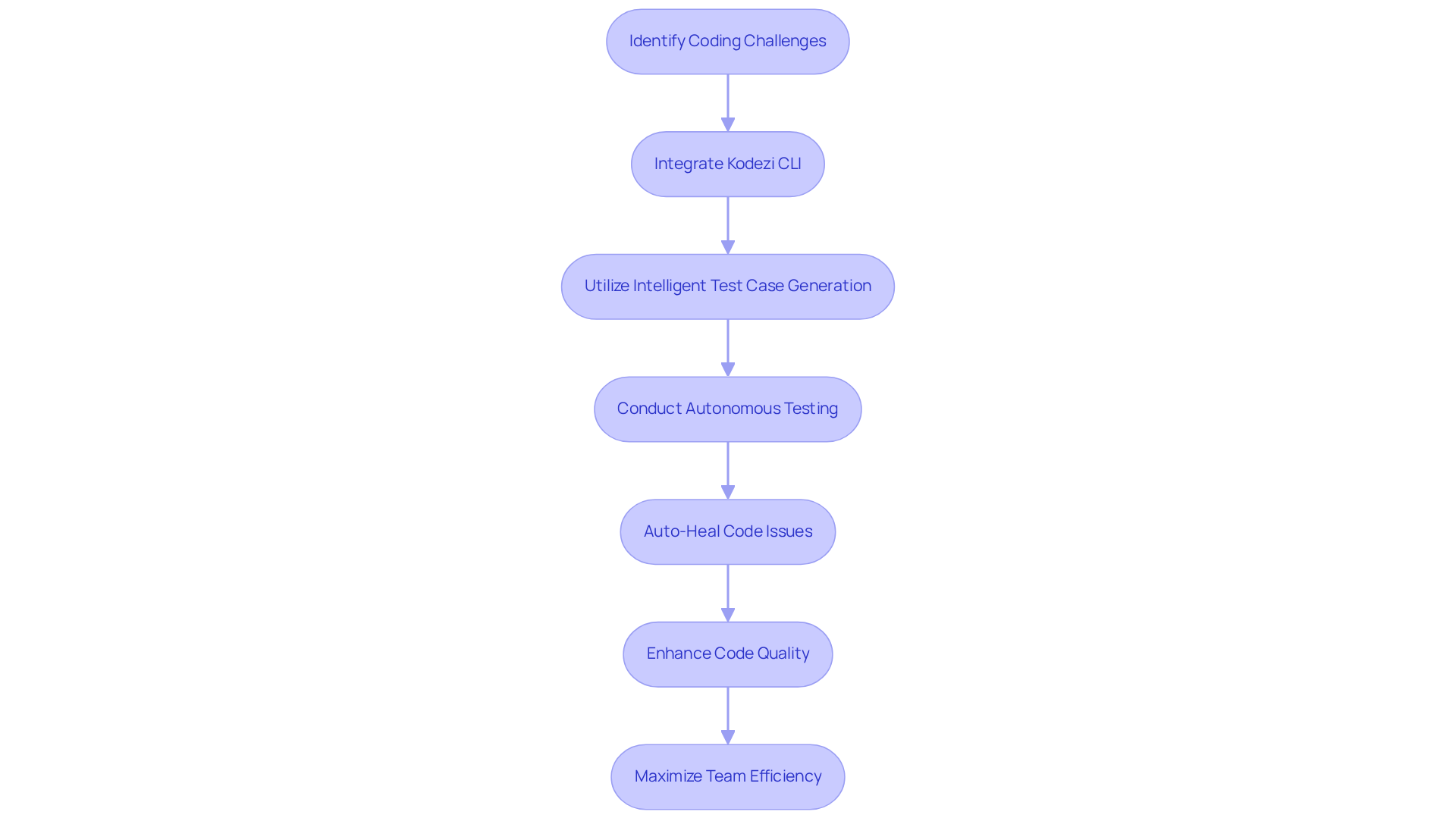
QA Copilot: Enhance Testing Accuracy and Efficiency
The ai software testing assistant significantly enhances quality assurance accuracy and efficiency by offering intelligent suggestions and automating repetitive tasks. This AI software testing assistant seamlessly integrates into existing workflows, enabling QA teams to concentrate on essential assessment tasks while it manages routine processes.
Furthermore, by utilizing advanced algorithms, the AI software testing assistant known as QA Copilot has been shown to reduce false positives by an average of 30%, leading to more reliable releases. For instance, teams utilizing the AI software testing assistant QA Copilot have reported a 40% increase in assessment efficiency, enabling them to allocate more time to exploratory evaluation and critical analysis.
As one QA engineer remarked, 'Automation has transformed our approach, enabling us to focus on what truly matters—ensuring quality.' This transformation not only enhances the overall evaluation process but also contributes to a more robust software development lifecycle with the help of an ai software testing assistant.
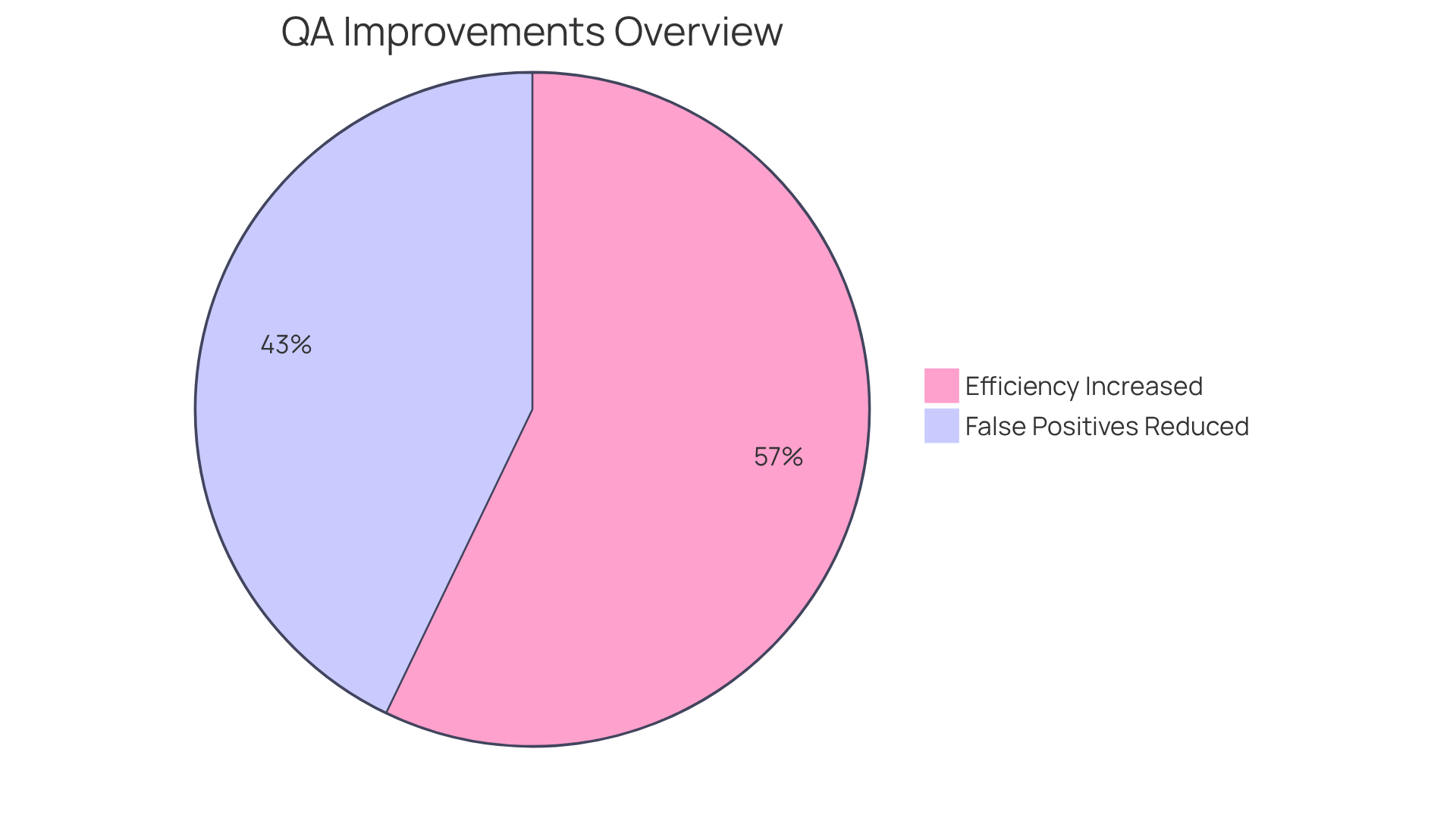
InfoQ: Transform Traditional Testing with AI Innovations
AI advancements are revolutionizing traditional assessment methods, enabling groups to significantly enhance efficiency, precision, and test coverage. By integrating AI into their evaluation processes, organizations can improve operations, fostering more adaptive and responsive strategies essential in today’s rapidly evolving development landscape.
For instance, organizations leveraging an AI software testing assistant have reported substantial improvements in evaluation efficiency, with 39% of groups experiencing increased productivity and a reduction in manual errors. Industry leaders emphasize that utilizing an AI software testing assistant not only accelerates evaluation cycles but also enhances the quality of applications through real-time monitoring and predictive analytics.
As we move toward 2025, the role of the AI software testing assistant in assessment continues to evolve, establishing it as a crucial tool for teams aiming to maintain a competitive edge in program development.
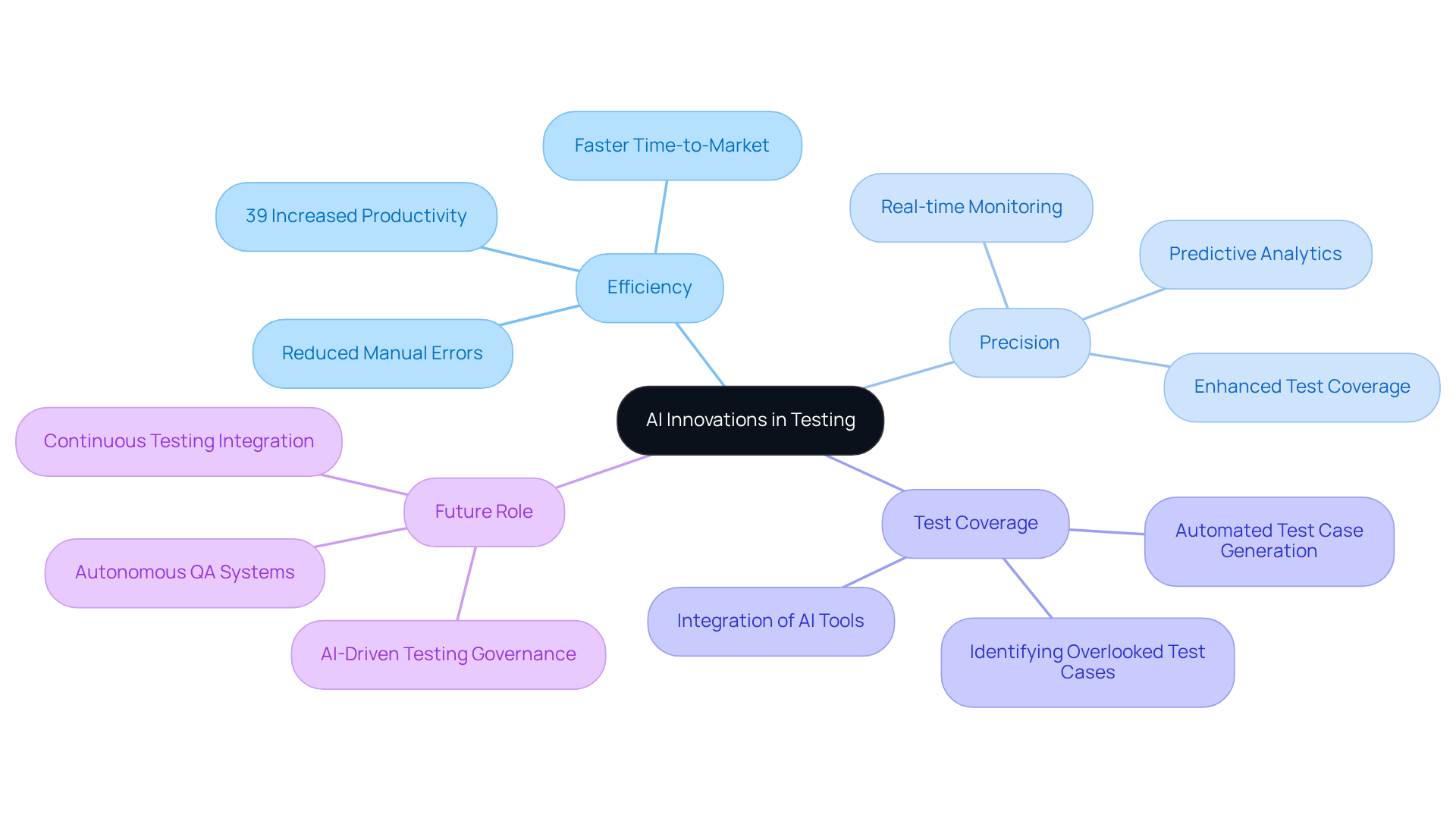
Exploratory Testing: Leverage AI for Enhanced Bug Detection
Coding challenges can be daunting for developers, often leading to inefficiencies and overlooked bugs. However, the AI software testing assistant greatly benefits exploratory testing by assisting testers in identifying potential bug areas and suggesting relevant test scenarios. By examining historical data and user behavior, AI tools direct testers to concentrate on high-risk areas. This proactive approach enhances the chances of identifying critical bugs prior to release, ultimately improving overall program quality.
As organizations increasingly adopt AI software testing assistants in their QA frameworks, the effectiveness of bug detection is expected to improve significantly. Incorporating an AI software testing assistant into evaluation strategies is essential, as it not only detects vulnerabilities but also enhances the efficiency of assessments. This leads to more dependable software products. Kodezi CLI exemplifies this trend by autonomously enhancing codebases and correcting errors before they reach production. This makes it an invaluable resource for B2B engineering groups.
By utilizing Kodezi CLI, organizations can significantly improve programming efficiency and guarantee a more resilient evaluation. Imagine reducing the time spent on debugging while simultaneously increasing code quality. Kodezi not only addresses common pain points but also empowers developers to focus on what truly matters—creating exceptional software. Explore the tools available on the Kodezi platform to elevate your coding practices today.
Future of AI in Software Testing: Adapting to Evolving Needs
The future of AI in application evaluation is set for remarkable progress as teams adapt to their evolving requirements. As systems become more complex, the AI software testing assistant plays a crucial role in automating evaluation processes, enhancing precision, and offering valuable insights into system performance. With the advancement of AI technologies, more sophisticated assessment strategies will emerge, keeping pace with the rapid evolution of application development.
For instance, 72% of firms allocate a significant portion of their QA budget to test automation, highlighting the growing reliance on the AI software testing assistant to enhance application quality. Furthermore, the global AI market is projected to grow at an impressive CAGR of 37.3% from 2023 to 2030, indicating a strong integration of AI into application evaluation methods.
Thought leaders emphasize the significance of AI in this field. Bill Gates asserts that AI will evolve into a superintelligence, stressing the need for responsible development that aligns with human values. Similarly, Sundar Pichai envisions AI as a transformative force, capable of augmenting human capabilities rather than replacing them.
As companies increasingly adopt AI technologies, they are not only improving evaluation efficiency but also adapting to the shifting landscape of application development. Kodezi's automated code debugging capabilities exemplify this transition, enabling teams to swiftly identify and resolve codebase issues, optimize performance, and ensure compliance with security best practices. This evolution underscores the necessity for continuous innovation in assessment methodologies, ensuring that the AI software testing assistant remains a central element in achieving high-quality software delivery.
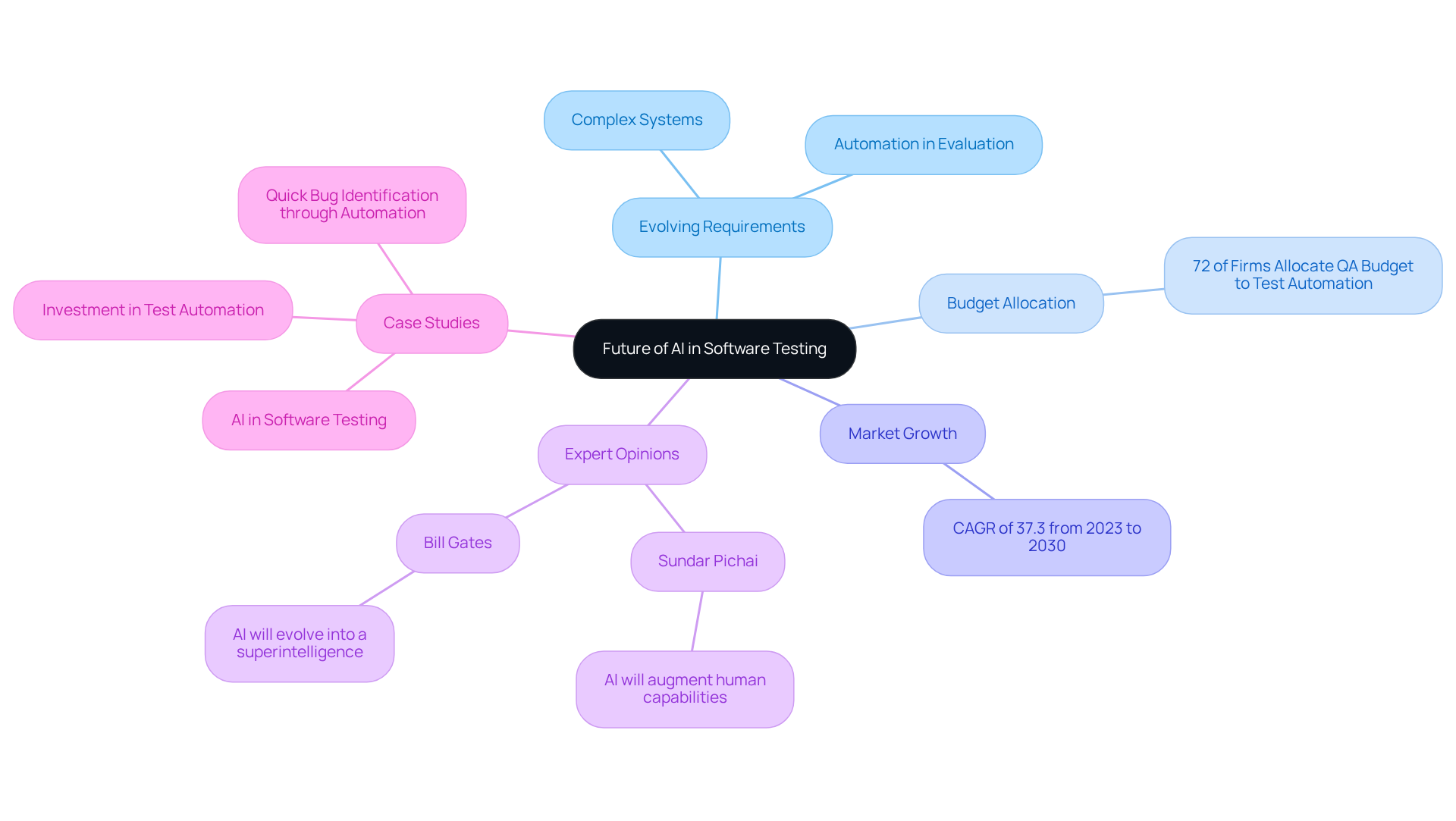
Performance Testing: Utilize AI for Enhanced Load Testing
AI can significantly enhance performance testing by automating load testing processes and providing real-time insights into system performance. Have you ever faced challenges in identifying bottlenecks before deployment? By simulating various load conditions, AI tools can help teams pinpoint these issues and optimize system performance proactively. This approach not only ensures that applications can effectively handle user demand but also leads to improved user satisfaction. As highlighted by Gunasekaran R., addressing performance issues early is crucial for sustaining user engagement and fostering trust in applications.
Furthermore, Google's adaptive load evaluation tool utilizes machine learning to dynamically adjust parameters based on performance feedback. This offers accurate insights into application behavior, simplifying processes while greatly enhancing overall system reliability. Isn't it essential to have such capabilities in contemporary application development? Significantly, groups utilizing real-time performance feedback are twice as likely to identify issues in development before they reach production. This statistic underscores the vital role of AI in improving software quality.
To guarantee strong performance, teams should focus on adopting an AI software testing assistant that can adapt to evolving circumstances and user requirements. By leveraging these tools, developers can not only enhance productivity but also ensure a higher standard of code quality. Are you ready to explore how AI can transform your performance testing strategies?
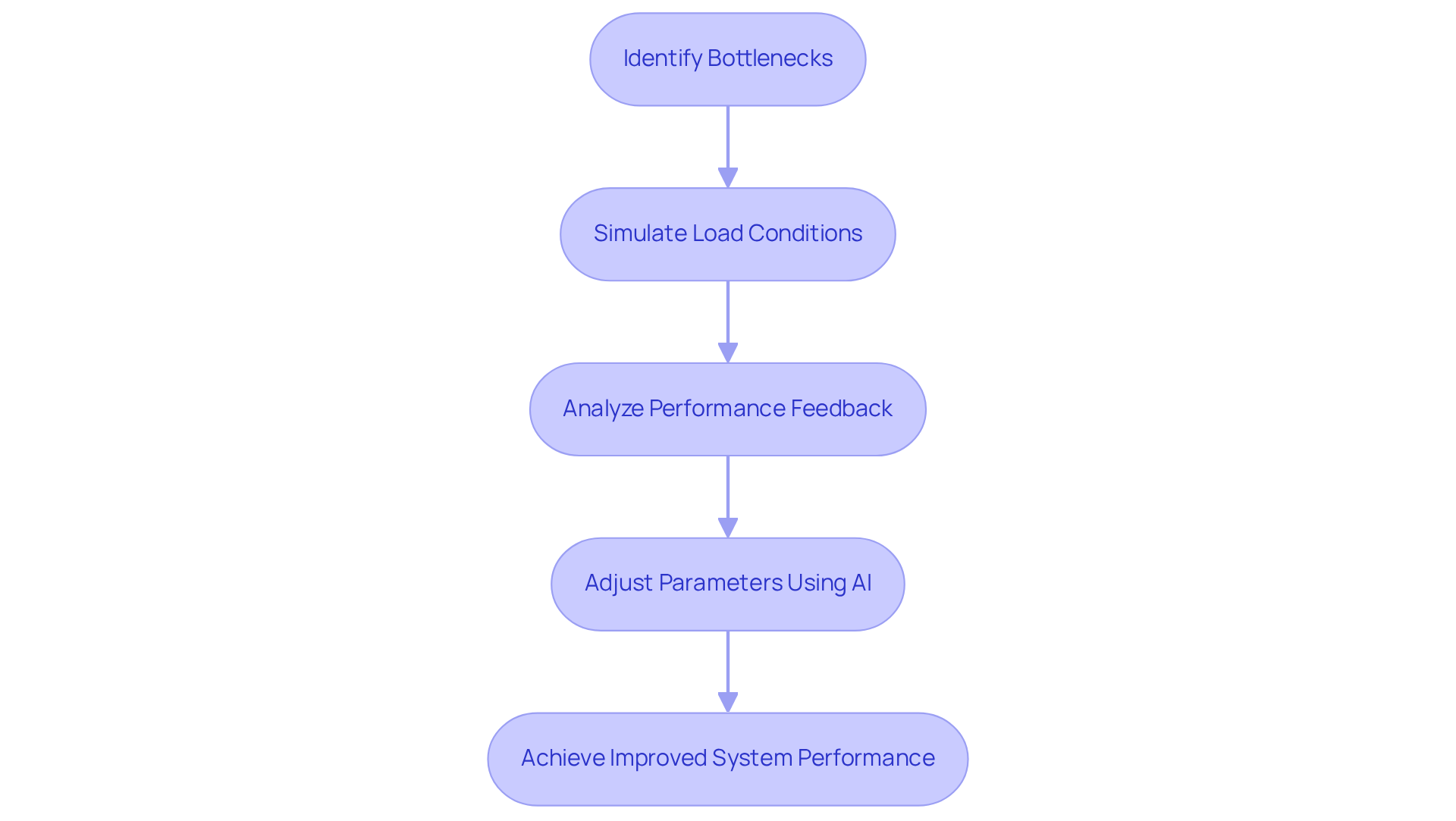
Ethical and Compliance Testing: Ensure Fairness with AI
AI plays a critical role in ethical and compliance evaluation, especially when it comes to analyzing algorithms for bias and ensuring adherence to regulatory standards. How can organizations effectively tackle these challenges? By utilizing an AI software testing assistant, teams can conduct comprehensive evaluations of their testing processes, efficiently identifying and addressing potential ethical issues before they escalate. This proactive approach not only enhances product quality but also builds trust among users and stakeholders.
Furthermore, AI compliance tools promote collaboration among technical, business, and compliance teams, ensuring that fairness remains a priority throughout the development lifecycle. As organizations increasingly acknowledge the significance of responsible AI practices, it’s noteworthy that:
- 77% of companies now view AI compliance as a top priority.
- 69% have implemented measures to assess compliance status.
This trend reflects a growing commitment to ethical standards.
Compliance officers stress the importance of maintaining fairness in algorithms, as untrustworthy AI can result in considerable reputational damage. By leveraging the capabilities of an AI software testing assistant, organizations can significantly enhance their bias detection efforts, ensuring that their software not only meets regulatory requirements but also aligns with ethical principles. Are you ready to embrace AI for better compliance and ethical integrity?

Conclusion
In the rapidly advancing world of software development, developers face numerous coding challenges that can hinder their efficiency and productivity. The integration of AI software testing assistants, such as Kodezi, LambdaTest, and Rainforest QA, emerges as a game-changer, enhancing accuracy and overall quality. These innovative tools streamline workflows, automate tedious processes, and ensure compliance with coding standards, allowing teams to focus on delivering high-quality software without being bogged down by manual testing tasks.
Kodezi addresses these challenges with its automated debugging capabilities, which significantly reduce the time spent on evaluations and improve code quality. Similarly, LambdaTest offers real-time browser testing, enabling developers to ensure their applications perform optimally across different environments. Furthermore, platforms like Rainforest QA simplify test creation, making it accessible for teams with varying levels of expertise. The proactive nature of these AI assistants fosters a more robust development lifecycle by allowing developers to identify and rectify issues before they escalate.
As reliance on AI technologies continues to grow, organizations are encouraged to embrace these advancements to remain competitive in the software development landscape. The future of software testing lies in the ability to adapt to evolving needs and incorporate AI-driven solutions that enhance productivity and ensure ethical compliance. By investing in AI software testing assistants, teams can elevate their coding practices and contribute to a more efficient and reliable software development environment.
The call to action is clear: explore the transformative potential of these tools and take the necessary steps to integrate AI into your testing strategies today. How can you leverage these advancements to improve your development process? The time to act is now.
Frequently Asked Questions
What is Kodezi and what does it do?
Kodezi is a professional OpenAPI specification generator designed to automate debugging and test maintenance. It continuously monitors codebases, detects issues, and autonomously resolves them, ensuring tests remain functional and up-to-date.
How does Kodezi enhance code quality?
Kodezi enhances code quality by automatically fixing performance bottlenecks, identifying security issues, and ensuring compliance with the latest coding standards. It also generates OpenAPI specifications, streamlining API documentation and testing processes.
What benefits does Kodezi provide to B2B engineering teams?
Kodezi provides B2B engineering teams with a seamless integration into their development workflows, allowing them to maintain high-quality code without manual intervention, ultimately improving efficiency and reducing the burden of debugging.
What is LambdaTest and how does it assist developers?
LambdaTest is an AI software testing assistant that helps developers assess code quality and compatibility across various platforms. It features real-time browser examination and automated screenshot generation, significantly improving efficiency in testing processes.
How much time can organizations save using LambdaTest?
Organizations using LambdaTest have reported time reductions in evaluation processes by as much as 80%, enhancing productivity and overall application quality.
What challenges does Rainforest QA address for developers?
Rainforest QA addresses challenges in coding and testing by utilizing an AI software testing assistant to simplify test creation and maintenance, allowing users to articulate tests in plain English that are automatically transformed into automated tests.
What are the advantages of using Rainforest QA?
Rainforest QA accelerates the evaluation process, reduces the workload on developers, and boosts productivity, enabling teams to focus more on coding while delivering higher quality outcomes in software development.
How do AI software testing assistants impact software quality assurance?
AI software testing assistants, like Kodezi, LambdaTest, and Rainforest QA, are essential for accelerating assessment cycles, enhancing precision, and transforming coding practices, thereby playing a significant role in the future of quality assurance.




